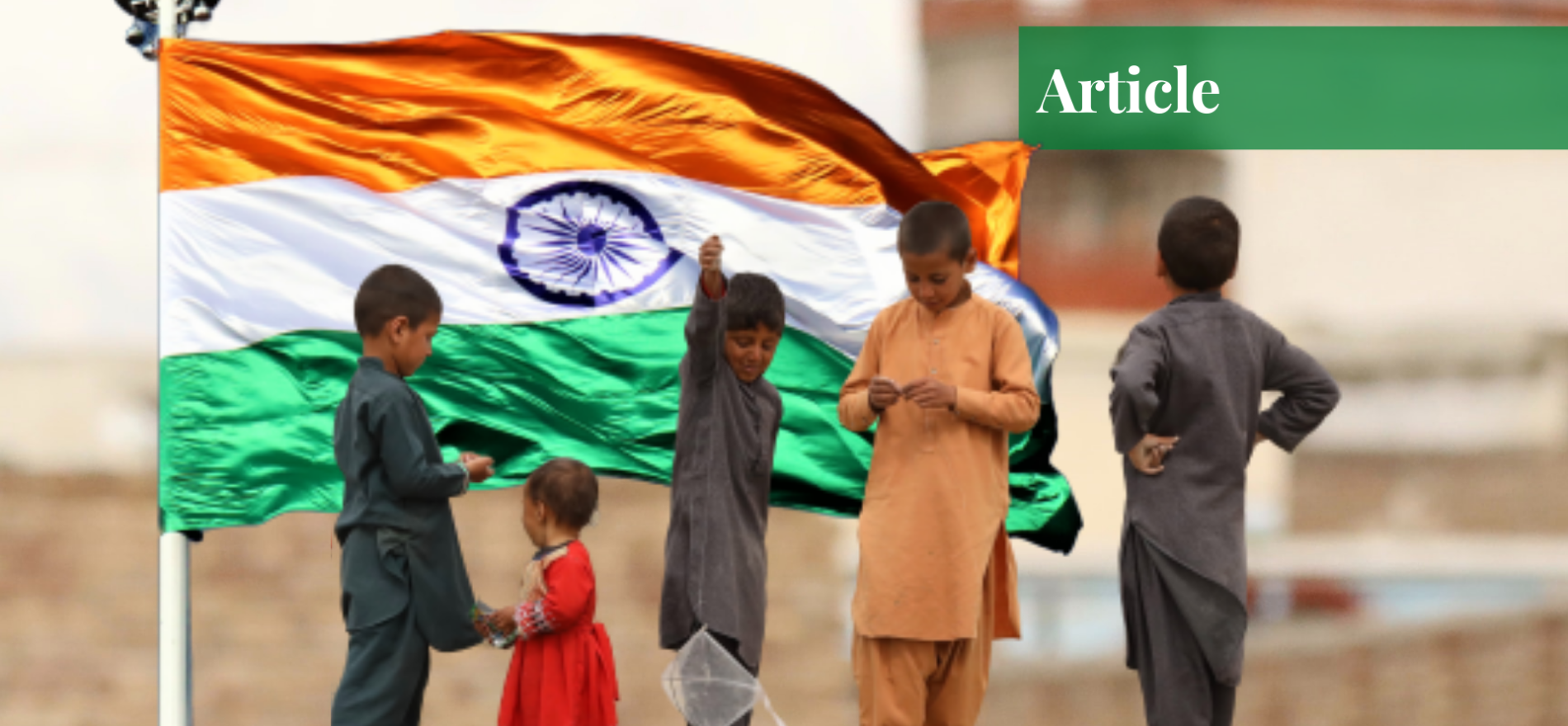Mr Muhammad Hamza Tanvir is an independent journalist and a political analyst, focusing primarily on regional and global strategic and political issues. He has authored numerous articles for different national and international publications.
After the recent takeover of the Taliban in Afghanistan, Indian media reporters seem to go mad. The years of India’s investment in Afghanistan, to flatter Afghanis and make them turn against Pakistan, have now been rendered meaningless. Although the policy of Indian investment in Afghanistan succeeded a bit, the recent takeover of the Taliban in Kabul and the US withdrawl from Afghanistan portends that India invested on the wrong side.
The Indian policymakers are in a state of shock due to their anti-Taliban role in Afghanistan. They kept assisting the Afghan National Army with military equipment but they were not aware that their puppet, the Afghan army, is not courageous enough to fight with the Taliban or any other army.
Previously, the Taliban had taken control over the dam built by India’s investment in Afghanistan, and recently a picture circulated on the internet showing that the Taliban have also captured a Mi-24 Helicopter gifted by India to the Afghan government. The takeover of the Taliban in Afghanistan is a nightmare for India due to its atrocities in Kashmir and its investment on the wrong side.
The Indian policymakers are worried that the Taliban government in Afghanistan will provide impetus to the movement of independence in Kashmir and the Taliban will support the Mujahideen in Kashmir. The Taliban government is also a threat to the Indian designs of reaching the Central Asian countries for trade in the future. Furthermore, it brings an end to India’s dream of using Afghanistan to destabilize Pakistan through its western border.
The United States of America has not only left Ashraf Ghani in the lurch but India as well. The USA and its allies are trying to use Pakistan as a scapegoat for their failure in Afghanistan. If their false blames are taken seriously for an instance, it shows the victory and power of Pakistan’s policymakers and intelligence agencies that they have defeated another world power in the Afghan theatre. Secondly, it must be appreciated that the Pakistan army is the only army in the world that has successfully eliminated all sorts of terrorists from its soil.
Indian Investment in Afghanistan
India’s investment in Afghanistan, in infrastructure development, amounts to $3 billion during the last two decades. Indian projects include roads, schools, and libraries in the country. They have also given many scholarships for Afghan students to use in the future as their soft power. This policy of India was a success as she succeeded to spread her anti-Pakistan narrative among the Afghan citizens to a great extent.
This could be gauged by the recent anti-Pakistan protests of the Afghan diaspora in the UK in front of Pakistan’s embassy. It is a disgrace that the Afghanis forget about those who helped them in every crisis and provided them with shelter and food when they were facing intense war in their native country.
Salma Dam is one of the major projects of India in Afghanistan. It is also regarded as Afghan-India Friendship Dam. The dam is located in the Herat province of Afghanistan and has been taken over by the Taliban. They launched a major offensive in the area during which many security personnel were killed.
Similarly, as a result of India’s investment in Afghanistan, the Afghan parliament building was also built with Indian collaboration. The building cost $90 million and the Indian prime minister, Narendra Modi, inaugurated it. A block inside the building was also named after the former Indian Prime Minister Atal Bihari Vajpayee.
This shows the graveness of the friendship between the Indian and former Afghan governments. It also portends Delhi’s influence, gained through Indian investment in Afghanistan, over the US-backed Afghan leaders who have now been ousted by the new Taliban regime.
Another major project initiated by India in Afghanistan is the Zaranj-Delaram Highway made by India’s Border Roads Organization. The project costs $150 million to India. This highway holds utmost strategic importance for India as it lies in proximity to the Iran-Afghanistan border. 11 Indians lost their lives during the construction of this highway.
India has transported 75,000 tons of wheat to Afghanistan through this highway via Chahbahar. This route was constructed by India to reach the landlocked Afghanistan and Central Asian countries in case Pakistan rejects the Indian request for overland access to Afghanistan. Reportedly, more than 65,000 Afghan students have studied in India.
As per Indian media, no part of Afghanistan has remained untouched by the more than 400 projects India has started in the 34 provinces of Afghanistan. All this has gone futile in Afghanistan. But that’s not what Indians are worried about; instead, the government of the Taliban – which will be hostile to India – is what it has never even imagined in its wildest dreams.
End to Indian Proxies against Pakistan
The fall of the Indian and US-backed Afghan governments has rendered the Indian proxies against Pakistan from Afghan soil futile. India has long been using the erstwhile porous border of Pakistan with Afghanistan as an opportunity to use it for fueling terrorism in Pakistan. The latter has alleged many a time that India is using Afghan soil to sponsor terrorism in Pakistan – which means that a peaceful Afghanistan is not in the interest of the Indians.
Recently, Pakistan has blamed India and Afghanistan for being involved in the terrorist attacks on the bus in Dassu in which several Chinese workers were killed. The Foreign Minister of Pakistan Shah Mehmood Qureshi has claimed that the Indian and Afghan intelligence agencies were in collusion for conducting the bomb attack.
The Kalbhushan Yadav case is a sheer instance of how Indian proxies are sponsoring terrorism in Pakistan and how India has supported Tehreek-e-Taliban Pakistan (TTP) and the Baloch Liberation Army (BLA). It is believed that BLA was being supported by India through the East Turkmenistan Islamic Movement (ETIM), which is alleged to be in league with the former.
The Taliban government has promised China that they will not let ETIM hold its foot on Afghan soil. This contends that all the major organizations being used by India through Afghanistan will find it difficult to have any firm footings in Afghanistan, as the Taliban are also seeking new global allies.
Recently, Pakistan’s national security advisor, Moeed Yousaf, has stated that Afghanistan was forced to become a sanctuary for terrorists by India. He also blamed India for being involved in the Lahore attacks. It must not be forgotten that an Afghan citizen, Eid Gul, was also involved in that attack which substantiates Pakistan’s claims of Indian usage of Afghans for sponsoring terrorism in Pakistan.
Pakistan has repeatedly claimed that India was using its embassies in Afghanistan to sponsor terrorism in Pakistan. India has also been accused of trying to mar the Afghan peace talks, as the Indian policymakers knew very well that any kind of Taliban’s share in the Afghan government would prove to be a hurdle in its designs to influence Afghan officials. India also wanted to keep Afghanistan unstable so that it could keep Pakistan anxious about her western border too.
The takeover of Kabul by the Taliban has proven to be an utter shock for Indian policymakers as well as the USA—which is evident from the recent statements of President Joe Biden. India has closed all its embassies in Afghanistan and has taken back all its citizens from the state after the Taliban takeover. This has also impacted all of the projects under India’s investment policy in Afghanistan.
The closure of Indian embassies will prove lucrative for Pakistan as it means the closure of a war front, to a greater extent, on the western border of the country. It would help reduce the terrorist activities of BLA and other terrorist groups which were being supported by India in Afghanistan. The Taliban have also promised the world that they will not allow anyone to use Afghan soil against any country.
The clamor of Indian media, after the Taliban takeover in Kabul, shows the intensity of Indian regret on the failure of its Afghan policy. The anti-Taliban role of India in the Afghan war could have detrimental impacts on India in the future. It would curb India’s investment in Afghanistan and the Indian influence as well.
Recently, India has started reviewing its Afghan policy. It is believed that India is scrambling for having good ties with the Taliban but the chances are meager due to the extreme anti-Taliban approach of Indian policymakers in the past. Furthermore, Pakistan’s good ties with the Taliban could also prove a hurdle in India’s pursuit of good relations with the Taliban.
A New Regional Bloc to be Expected: More Nuisance for India
It is perceived that a new bloc will be made in the region shortly as all the regional powers are seeking an alliance with the Taliban. The bloc will comprise Russia, China, the Taliban, Iran, and Pakistan. All the participants of the bloc will be anti-West, especially anti-USA. This bloc will prove to be further weakening the regional position of India as it will be hard for it to find allies in the region.
The Guardian has also reported that the influence of Pakistan, Russia, and China is likely to increase in Afghanistan under the Taliban government. Iran which was formerly allied with India has also left it and opted to go with China. Iran is also attempting to reach the landlocked countries of Central Asia which can prove lucrative for its economy and prosperity.
For this purpose and to protect the Shia minority in Afghanistan, Iran has also made cordial relations with the Taliban and is seeking a stable and friendly neighbor in the future. A stable Afghanistan is crucial for linking Chahbahar with China via Afghanistan. The conflict between China and India is very well known. India wants to hamper China from being a global hegemon and has dreams to be a regional hegemon but she must remember that there could only be one sun in the East, and that is undoubtedly no other than China.
The recent meeting between the Taliban delegation and the Chinese officials indicates a possible alliance between the two in the future because a peaceful neighborhood is imperative for China’s smooth rise. China could not afford any disturbance on any of its borders or in the Xinjiang region as it already has a rivalry on its Indian side of the border.
The burgeoning cordiality between India and the United States can also impinge the Russia-India relations. Although Russia and India have always enjoyed good relations, the changing regional and global political scenario will harm the relations between the two. Russia could be regarded as the oldest ally of India in the region but in international relations, the only thing constant is national interests, not the friends or foes.
Russia is one of the first major powers to engage the Taliban. It is also reported that after the recent takeover by the Taliban, the Russian ambassador to Kabul has stated that Afghanistan seems safer under the Taliban. Similarly, Pakistan also wants a stable Afghanistan because it has already been mired in numerous problems due to instability in the latter state in the past. Stability and a strong government in Afghanistan will also help to prevent terrorism and Indian proxies in Pakistan. Since Pakistan and US relations have always been up and down, Pakistan should ensure a balance where the appease the Taliban, while not antagonizing the US.
So, it is most likely that the Taliban and Pakistan will enjoy cordial relations with each other because they can afford no other option. Pakistan must take a prudent approach but should not lose the chance of friendship with the Taliban and give any sort of opportunity to India to further its fascist agendas in Pakistan through Afghanistan. The new regional bloc could not only prove disastrous for India’s regional designs but will also prove the same to the United States and its allies.
If you want to submit your articles and/or research papers, please check the Submissions page.
The views and opinions expressed in this article/paper are the author’s own and do not necessarily reflect the editorial position of Paradigm Shift.



















